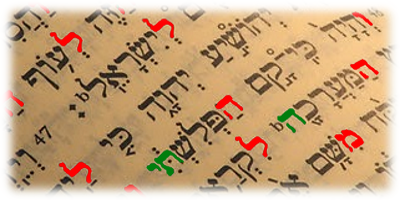Morphology is the study of how words are formed and as Hebrew words often contain several affixes (i.e., prefixes and suffixes), morphology is a very important subject in Hebrew linguistics. In Psalm 45 verse 3 (2 in Christian Bibles) I came across a Hebrew word with a very complex morphology and thought that this word would make a good demonstration of how Hebrew words are formed. Here is the word:

The Noun
This is the Hebrew noun שפה (S.P.H) and means “lip.” If you will notice, only the first two letters (in red) of this noun appear in the word above. I’ll come back to why that is in moment.
Prefix
The letter ב (b, in blue) is a prefix that usually means “in,” but can also mean “with.” So, בשפה (b’saphah) means “with a lip.”
Suffix #1
The Hebrew noun שפה (S.P.H) is a feminine noun and when a feminine noun is in the plural, the feminine plural suffix ות (ot, in green) is used. Many feminine nouns end with ה (h), such as this one, and when they do, and the ות (ot) suffix is added, the ה (h) changes to a ת (t, in orange). So בשפות (b’saphot) means “with lips.”
Suffix #2
The masculine plural suffix is ים (iym), such as can be found in the word אלהים (elohiym), which is usually translated as “God” (Hebrew plurals can under certain circumstances be a singular noun), but also “gods.” When a masculine plural noun is written in the construct state, as in “God of…,” then it is written as אלהי (elohey). Note that they letter ם (m) is dropped and all that is left of the suffix is י (ey). When a feminine plural noun, such as בשפות (b’saphot, “with lips”), is in the construct state, the same י (ey, in lavender) used in masculine possessive nouns, is added to the feminine plural noun-- בשפותי (b’saphotey) and means “with lips of…”
Suffix #3
The final letter in the word, ך (kha, in black), is the second person, masculine, singular pronoun (you). So, the word בשפתותיך (b’s’ph’to’tey’kha) means “with lips of you” or “with your lips.”

Like what you’re discovering? Continue the journey from Bible reader to translator.
|






